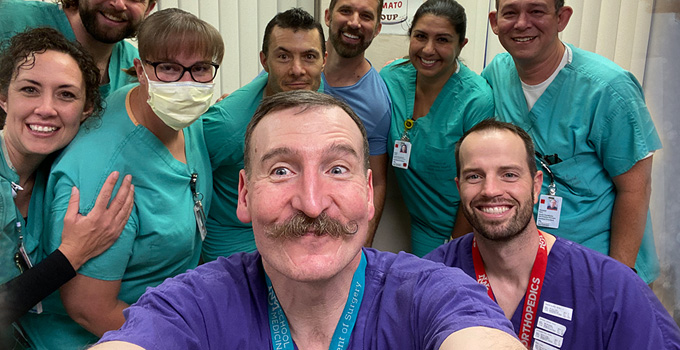“I bet you won’t join the Army,” said two friends to each other back in 1992 in Bloomington, Indiana, laying down a dare.
“So, I did it,” said one of the young men, who was 20 at the time. “I didn’t have anything else going on in my life and I had always been interested in the military, so I went down and enlisted.”
In 1993, after completing extensive training, he was assigned to the 1st Battalion 75th Ranger Regiment—part of the U.S. Army Special Operations Command.
Thirty-two years later after that dare brought him into the military, the University of New Mexico Hospital’s fifth-year general surgery resident, Andrew D. Fisher, MD, MPAS, has dedicated his career to saving lives wherever there is a need.
“New Mexico and UNM Hospital have a diverse population who often present with unique and challenging surgical issues that are not found in many areas of the U.S.,” Fisher said. “There is also a large percentage of the patient population who are underserved. Caring for them is an honor and privilege.”
In late March of 2024, Fisher answered the call of fellow former Special Operations service members, whose non-profit Sentinel Foundation fights the exploitation of children around the world.
“If we have the opportunity to help out and just get them to a better place, sign me up,” he said. “There are inherent risks associated with these types of operations. But to me, it's worth it.”
A Fox News video of the dramatic rescue shows a helicopter and rescue crew hovering over a barge floating in war-torn Haiti, lifting 59 children and young adults with special needs one by one to safety.
The U.S. government had issued warnings for Americans not to travel to Haiti and had flown non-essential personnel out of the country in March, following the announcement by Haiti’s prime minister that he would resign due to the mass violence and chaos of gangs overrunning the country. This meant that there were thousands of Haitian children whose place with non-profits run by American citizens was in jeopardy, as those Americans had been evacuated, according to a story about the rescue by Fox News.
If we have the opportunity to help out and just get them to a better place, sign me up. There are risks associated with doing these things. But to me, it's, it's worth it.
The Sentinel Foundation had reached out to Dr. Fisher for his medical expertise from his years of military service as a physician assistant, as well as an EMS and paramedic, to help the children with acute or traumatic injuries. The organization believed the children could be in danger due to worsening conditions in Haiti.
He and other members of the Sentinel Foundation team planned the rescue in the neighboring Dominican Republic.
“I had an understanding of how to conduct this mission in a manner that would not only provide us with adequate trauma care if something tragic were to happen, but also of the overall health and care of people with chronic illnesses,” Fisher said. “Certainly, being a surgery resident has prepared me to do that, I think, on a much deeper level.”
Although the team, made up of others who had been in Special Operations and had conducted similar operations during their active duty, had anticipated treating either chronic illness and wounds that needed immediate attention, the children and young adults were mostly in need of medication for the vomiting and nausea due to motion sickness, Fisher said. “That means to me, they were doing a pretty good job in Haiti with what they had in order to care for these kids,” he said. “So that was quite a relief. Part of the process of being involved in hundreds of combat missions, you imagine and plan for the worst possible outcome, then performing an anaylsis for what is realistic and what is likely to occur.”
Fisher, who had to return to UNM Hospital to fulfill his duties as a general surgery resident, stayed in touch with the team via phone and text.
One of the problems he helped solve was the dwindling supply of medication for motion sickness. The team had purchased Benadryl, Dramamine, and other over the counter medications as the mission planning took shape in the neighboring Dominican Republic, but supplies ran out.
So Fisher and the team addressed it over texts.
“There was a study a few years ago that talked about using isopropyl alcohol, like the alcohol prep pads used for IVs, for nausea. That you can sniff them, and it works as well as some medications for nausea. This worked well for both the orphans and rescue team.”
The Sentinel Foundation team, with the Tim Tebow Foundation, and Rep. Cory Mills, R, Fla., successfully relocated the children to safety in Jamaica.
Being part of the mission to assist children who are at risk due to trafficking is part of what drives the work of Fisher, who has participated in over 500 special operations missions and eight deployments to Afghanistan and Iraq. He received a Purple Heart in 2011 for his 2010 service in Afghanistan as captain and senior physician assistant when he climbed a roof to help other wounded Rangers while wounded himself. He also received the Bronze Star with Valor, and other awards during his military career.
Rescuing children from danger, saving lives on the battlefield and in the hospital, and educating the public on how tourniquets can save lives, as he did in his TEDx Talk in 2016, From Battlefields to Our Neighborhoods: A Path to Zero Preventable Deaths, is a long way from the young man growing up in Bloomington, Indiana, who joined the Army on a dare.
And the 1st Battalion 75th Ranger Regiment, his first assignment as an infantry soldier, would be the place where he would return over the years as he continued his medical training. He was first sent to an EMT course, the first stepping stone to learning how to improve the odds of survival by assisting medics on the battlefield
Fisher would serve nine years in the 75th Ranger Regiment as a physician assistant, eventually becoming the Regimental Physician Assistant in 2015, following years as an EMT and paramedic when his first enlistment ended. Then, at 41, he decided to go to medical school.
“As a PA, in the 75th Ranger Regiment, I had the opportunity to work with many surgeons, due to the number of combat wounded casualties.” he said. “I took care of severely wounded Rangers. Some like my medic Sergeant Jonathan K. Peney died, which was devastating… and that was kind of my driving force. I wanted to be a surgeon because I want to be able to identify these types of patients who are potentially survivable and take care of them, so they can make it home.”
After completing medical school at Texas A&M in 2020, Fisher, a member of the Texas Army National Guard, continued his medical training as a general surgery resident at UNM Hospital, where he is in his fifth year of residency.
Despite being decades older than his fellow residents, Fisher said that the group—who began their residency during COVID—are tight-knit.
“I’m used to working with younger people throughout my career,” he said. Certainly, generational things change. But you learn how to adapt…It's an opportunity for me also to learn how to become maybe a better leader, or a better surgeon, or a better resident.”
Dr. Erin Howell, 37, a supervising attending acute care surgeon at UNM Hospital, is one of those people, a supervisor who Fisher considers a mentor.
“Being a young woman in what is traditionally a male dominated specialty, and having a male trainee, who's more than a decade older than you…I was humbled that he valued and looked up to me,” Howell said. “And it's been a privilege to work with him and mentor him. He's one of the hardest working people I have ever met. And he's incredibly respectful of everybody, their background, and their contribution. And his background and insights of having been in combat are incredible.”
Fisher was also the 2023 UNM Pediatric Surgery Resident of the Year, an award that Howell said was especially well-deserved.
“He approached what is often a difficult rotation due to having sick children and the complexities of families with an unusual sense of maturity,” she said. “He really went above and beyond in terms of reaching out to the supervising attendings to say, ‘how can I be the most effective?’ and then also lead his team well, while also providing compassionate quality care, to those patients, and also their families. When you're dealing with pediatric surgery, the patient is more than just the sick child, it truly is an extension to the family. And I think he's somebody that during those times, the patient’s parents could really say this is somebody who cares and is taking this seriously and hearing us.”
Fisher has started his fifth and last year of residency, followed by a fellowship in trauma and acute care surgery and a career as a trauma surgeon. Still, these years later, his mission is to help those in their time of greatest need where medical attention must be swift and sure.
“The opportunity to help people in those situations is fulfilling to me,” he said. “The opportunity to help people as a surgeon is pretty unique.”